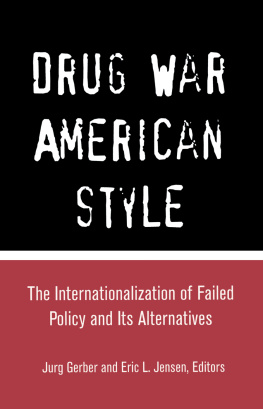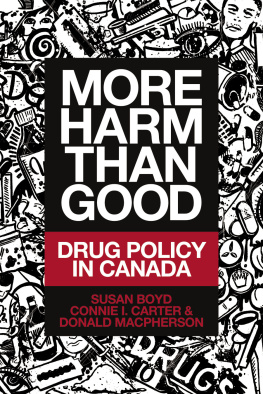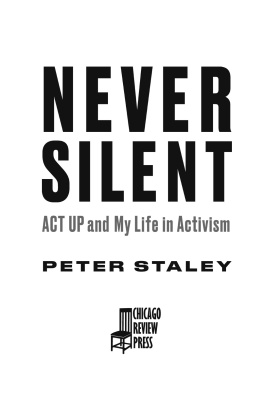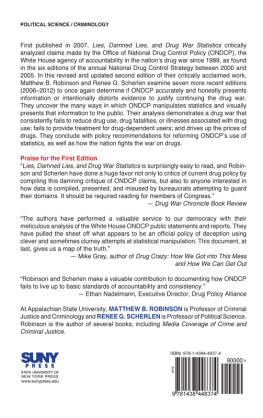First published 1992 by Transaction Publishers
Published 2017 by Routledge
2 Park Square, Milton Park, Abingdon, Oxon OX14 4RN
711 Third Avenue, New York, NY 10017, USA
Routledge is an imprint of the Taylor & Francis Group, an informa business
Copyright 1992 by Taylor & Francis.
All rights reserved. No part of this book may be reprinted or reproduced or utilised in any form or by any electronic, mechanical, or other means, now known or hereafter invented, including photocopying and recording, or in any information storage or retrieval system, without permission in writing from the publishers.
Notice:
Product or corporate names may be trademarks or registered trademarks, and are used only for identification and explanation without intent to infringe.
Library of Congress Catalog Number: 91-32570
Library of Congress Cataloging-in-Publication Data
Staley, Sam, 1961
Drug policy and the decline of American cities / Sam Staley.
p. cm.
Includes bibliographical references.
ISBN 1-56000-039-2
1. Narcotics, Control ofEconomic aspectsUnited States. 2. Inner citiesUnited States. 3. Urban economics. 4. Drug trafficEconomic aspectsUnited States. I. Title.
HV5825.S65 1992
363.4'5'0973091732dc20
91-32570
CIP
ISBN 13: 978-1-56000-718-0 (pbk)
ISBN 13: 978-1-56000-039-6 (hbk)
To my parents, who taught me principles matter in public policy well as in life.
In August 1991, the National Commission on AIDS released a report whose findings were both extraordinary and self-evident. The report acknowledged the strong link between intravenous (TV) drug use and the spread of AIDS. That was not new. What was new was the reports endorsement of needle exchange programs as a way of slowing the transmission of AIDS, both among drug users and from drug users to their sexual partners and children. Never before had a commission of such stature so boldly chosen public health over the criminal law in fighting a drug-related disease. AIDS does that. This devastating disease, for which, as of now there is no cure, has led many people to rethink their assumptions about national drug policy. It led me to rethink mine.
In 1988,1 was on a panel of the U.S. Conference of Mayors. By then I had already served as Baltimore City States Attorney, the Citys chief prosecutor. In that role, I prosecuted thousands of drug offenders, including the murderer of a police officer on an undercover drug assignment. The officer was a friend of mine. His death, and the obvious futility of trying to prosecute our way out of addiction and drug-related crime, was the beginning of my search for a more rational and effective national drug policy. Then came the panel of the U.S. Conference of Mayors.
The panel was looking into the spread of AIDS in urban communities. The cities were (and still are) being especially hard hit by AIDS, with most of the victims being poor and minorities. (That trend has continued. In Baltimore, as of August 1990,77 percent of the adult AIDS cases were African-American, 21 percent were white, and 1 percent were Hispanic.) The principal cause of transmission of AIDS in cities was needle sharing among IV drug users. I drew the conclusion that our nation could no longer ignore the connection between AIDS and drugs. AIDS had become a national health crisis, and at least in cities, IV drug use was its primary agent.
Since AIDS is a public health problem, it makes sense to treat drug abuse as a public health problem too. That may include, as the Commission suggests, carefully controlled and thoroughly evaluated needle exchange programs. It certainly includes recognition that committing endless resources to catch and incarcerate drug addicts is not going to slow the spread of AIDS. The only effective way to do that is to (1) arrest the practice of sharing dirty needles, and (2) give substance abusers the treatment they need to control and preferably end their addiction.
Unfortunately, our current national drug policy remains heavily oriented toward the criminal law and mired in failure. That has been the story of the War on Drugs for seventy six years. It is also why following my participation on the AIDS panel for the U.S. Conference of Mayors, I publicly declared that it was time for a national debate on decriminalizing drugs. I put the question this way: Should we continue to pursue a policy that has not worked for almost three quarters of a century or should we look for both a new strategy and new generals?
In the four years since I called for this debate, there have been some moves toward treating substance abuse as a public health problem. Many states are putting more money into prevention and treatment. And the federal government also is paying more attention to the need for treatment.
But those changes, while visible and newsworthy, are less important than what is going on in universities, think tanks, and conferences and quiet discussions among policy makers and writers. That is where the core of the debate on national drug policy is taking place. And it is from this careful, rational, and analytical work that changes in national drug policy will come.
This book is an excellent example of the kind of thoughtful analysis that is needed if we are to come up with a better policy for dealing with substance abuse and its attendant problems, such as AIDS. Drug Policy and the Decline of American Cities analyzes the devastating cost American cities are paying because of the War on Drugs.
The spread of AIDS is one such cost, but not the only one. The criminal justice system in many cities is breaking down under the strain of drug arrests and incarcerations. In 1989, the Baltimore Police Department arrested over nineteen thousand people for drug violations, a 100 percent increase over 1984. This enormous volume of arrests has kept the Baltimore City Jail under federal court supervision for years. I was only one of several mayors required to keep the city jails population under a court imposed cap. It was not easy.
In 1991, the state of Maryland finally agreed to take over the city jail. That means better control and management of the prison population; but the underlying problems of overcrowded jails; overcrowded court dockets; a shortage of prosecutors, public defenders, and judges; and a lack of substance abuse treatment are bound to linger until drugs are made the responsibility of the surgeon general and not the attorney general.
The criminal justice system is but one of many urban institutions being crushed under the weight of the War on Drugs. Almost every local government service, including schools, health care, juvenile services, and neighborhood development and job training, is underfunded because billions of dollars are being syphoned off to pay for a failed national drug strategy. That money would be much better spent if it were invested in public education, Head Start, prenatal care, and other services designed to help children grow up healthy, smart, and full of self-esteem. Such an investment would also be a giant step toward fairness and justice. There are now more African-American men under the control of the criminal justice system than there are in college. There is something profoundly wrong with a policy that leads to such an unjust outcome. The fact of the matter is, those with the least hope, the least education, and the least chance of achieving economic opportunity are bearing most of the burden of drug addiction, incarceration, and drug-related crime. That might change, however, with a national drug policy that emphasizes public health.












